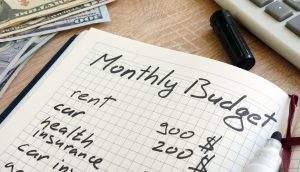by Tanya Hausman
I often spend time thinking about the best ways to prepare my children for the responsibilities of adulthood. Whether it’s teaching them the importance of proper hygiene, helping them learn how to manage their time between homework and social time, or encouraging healthy eating habits, I understand how vital it is that I be involved in their development.
One of the worries that I have personally experienced as a parent comes from my children having a debit card. Parents or guardians who have experienced a child begging for a brand-new iPhone or asking for money to go out with friends want that child to learn how to save money and spend it responsibly. Debit cards come with potential security risks on top of requiring some level of financial literacy.
Here are some tips to consider before letting your child have their own debit card.
Set Clear Rules
Before handing over the debit card, establish concrete guidelines for its usage. Discuss spending limits and clarify when and where you are comfortable with the card being used. Emphasize the importance of your child regularly checking their account balance before making a purchase.
Setting these rules in place at the start ensures less confusion later on.
Open a Linked Account
The best way to keep an eye on their spending habits is to link their checking account to your online bank account. This allows you to set spending limits and ATM access for children who are just starting to handle their own money, which gives them the freedom to use their debit card while putting restrictions in place.
Consider linking their account to your personal online banking account as it will also allow you to set up transfers between your other accounts and your theirs, making it easy to move money they earn from chores, allowance, etc. If they have a job, you can help them set up direct deposit into their account.
New Tripoli Bank customers can bring their children to any of our branches, and we’ll help to set all of this up!
Monitor Their Activity
Teaching children financial literacy and proper debit card use is a commitment towards long-term success. Once they have their own debit card, you’ll likely want to keep an eye on how they’re spending money. If you see them spending every dollar as soon as they get it, sit down with them and explain the importance of saving money for long-term goals, emergencies or just items that are important to them.
New Tripoli Bank’s online banking platform can help in this regard. You can add your child’s debit card to your account’s Card Secure and set up push or email notifications, so you are alerted whenever your child uses their card. Among other features, it also allows you to set restrictions on the card or deactivate it.
Teach Good Money Habits
It’s not enough to give your child the keys to their own finances; you need to show them how responsible adults budget their money. Most of a child’s learning comes from imitating those in their “money circle,” so it’s important to teach good habits.
Plan your monthly budget together. It’s important for children of all ages to learn concepts like income, expenses, and saving. If you’re currently saving up for a long-term goal, take the time to explain the budget process. Talk about how much you set aside each month, how you decided on that number, where you cut your other spending to save, and emphasize the importance of saving for the future.
Emphasize Security
A big part of using a debit card is making sure your personal and bank account information is secure. It’s critical they choose a strong, unique PIN for their debit card and go over emergency protocols in the event that the card is ever lost or stolen.
Customers at New Tripoli Bank can use the Card Secure feature on our online banking platform to monitor card activity. Take the time to go over their monthly bank statement together and explain how they can proactively identify potentially fraudulent transactions on their account in a timely manner.
Teach them the importance of online safety, whether it’s only buying from secure websites (look for “https” in the URL and a padlock symbol), avoiding entering personal information while on public Wi-Fi, or being able to identify scam ads and fraudulent offers on open marketplaces such as Facebook Marketplace.
Learning Through Experience
Mistakes on their journey to adulthood are likely. Use these mistakes as teachable moments instead. For example: if they overspend, spend some time talking about how it’s important to keep track of their account balances and avoiding impulse purchases.
As they become more comfortable using their debit card and show responsible habits, consider gradually loosening the controls you have on their card. This helps build trust between both of you and at the same time encourages them to continue practicing smart spending habits independent of your monitoring.
 Tanya Hausman is a Senior Deposit Operations Specialist at New Tripoli Bank. She has been working for the Bank since 2014 in various roles. Outside of work, she spends her time baking, hobbying, and raising her two children.
Tanya Hausman is a Senior Deposit Operations Specialist at New Tripoli Bank. She has been working for the Bank since 2014 in various roles. Outside of work, she spends her time baking, hobbying, and raising her two children.
Effective immediately, we are unable to accept loose or wrapped pennies due to the Federal Reserve Bank restricting the supply of pennies.
The U.S. Department of the Treasury has officially ended production of the penny, which means New Tripoli Bank can no longer order pennies from or ship pennies to the Federal Reserve. We understand that this change will impact all of our customers and wanted to provide information on this shift in our monetary system.
Here are the main ways this change will impact our customers:
- We may not be able to do change orders that include pennies.
- You may be required to deposit your check if the change back to you would require pennies. You can then withdraw the cash that you need.
- For non-customers cashing a check drawn on New Tripoli Bank, you may be required to open an account if the change back to you would require pennies (exceptions may apply).
- Retailers and businesses may begin rounding cash transactions to the nearest nickel as pennies become unavailable.
Why is penny production ending?
The decision stems from the rising costs to produce new pennies. The current cost of the materials to create a new penny is almost four times the value of the currency, which in turn costs the government money each year.
Even though pennies are no longer being produced, existing ones are still legal tender. Here are some smart ways to transition away from using pennies:
- When paying cash at retailers, expect totals to be rounded to the nearest five cents.
- Consider switching to using digital payments or your debit card, which remain unaffected by the change.
- Sign up for direct deposit for paychecks and government benefit payments.
 Every parent or guardian knows one of the most effective methods for motivating kids to do something boring is to turn it into a game. For example: assigning points values to household tasks like cleaning up their bedroom, putting away their toys, or taking out the trash, with the promise of a reward when the child reaches a certain point total.
Every parent or guardian knows one of the most effective methods for motivating kids to do something boring is to turn it into a game. For example: assigning points values to household tasks like cleaning up their bedroom, putting away their toys, or taking out the trash, with the promise of a reward when the child reaches a certain point total.
This is referred to as “gamification,” where you take the most engaging elements of a game, such as competition and rewards, and apply them to real-life activities. Gamification can help make otherwise mundane tasks feel less like chores by tapping into the human desire for achievement.
Gamification can be equally useful for adults trying to establish good spending habits. You can “trick” your brain into positive behaviors by attaching a reward to that behavior. Whether you’re looking for ways to teach your kids financial literacy or want to motivate yourself to get your finances in order, here are some ways you can gamify your savings.
Level Up Your Saving with Short-Term Rewards
Saving money is hard. At a basic level, you are depriving yourself of present gratification to save for a future goal. We’ve all heard of retail therapy; our brains are wired for the dopamine rush that comes from getting what we want, which leads many to spend their money as soon as they receive it (and sometimes even before then). However, we can use this chemical impulse to our advantage!
Setting up short-term, budget-friendly rewards for reaching savings thresholds can help alleviate this habit by providing you with small dopamine rushes along the path to your eventual savings goal. For example, let’s say you are trying to save up $1,000. You create a rule that, for every $200 you save towards this end goal, you will treat yourself by going out to a restaurant for lunch. Suddenly, saving that $1,000 becomes a series of “level ups” that you need to reach to “finish” your game, and along the way you get to enjoy the rewards of hitting each milestone.
One of the benefits of this strategy is that it requires you to pay attention to your income, which is an essential habit for anyone learning how to budget properly. You can maintain a better sense of your financial situation and become more mindful of the connection between your money and the time it takes for you to earn it.
Utilize Visualizations
Most people who have participated in a fundraiser will have seen an example of this strategy. Fundraising organizers use an oversized cardboard thermometer to represent the amount of money that has been raised, to provide a visual shorthand of the progress being made. By displaying the distance from the goal and seeing the shrinking gap between your current progress and the target, it helps you understand your progress at a glance and encourages you to continue as you get closer to your goal.
There are many savings apps that provide interactive charts, graphs, and other visual trackers to help turn numbers into easier-to-read visual data. These apps can also provide real-time updates and notifications to remind users of their achievements, which can also reinforce their motivation to save.
 Engage in Friendly Competition
Engage in Friendly Competition
While it can feel awkward discussing money issues with friends, sometimes having a support network around you is the best way to encourage saving. You should consider participating in a savings challenge with friends or relatives to encourage everyone to practice good spending habits. If you do decide to go this route, make sure to keep the competition friendly! Compete for bragging rights rather than material rewards.
You should consider creating a physical leaderboard that you can update periodically to show who is in the lead in your competition. This kind of challenge also encourages participants to share their progress, tips, and success stories with one another, as well as providing a support network in case certain participants are struggling to hit their savings goals.
Ready, Set, Save!
Introducing gamification into your personal finances can help you develop consistent savings habits. Our brains love completing challenges and earning rewards, but sometimes it can feel like saving money isn’t a reward in itself and you need that little extra push to get you into the habit.
Whatever it is you decide to do, the key is to get started and stick with your plan!
If you’re having trouble figuring out how to get started, reach out to a customer service representative at your financial institution. If you’re looking for a change in financial institution, New Tripoli Bank’s team of community bankers are trained to help individual customers who might need assistance when it comes to reaching financial goals, and we are constantly updating our online and mobile banking platforms to provide customers with the tools they need to practice good spending habits.
 Kate Hart-Zayaitz is New Tripoli Bank's Chief Lending Officer and Senior Vice President. Kate has spent many years working for various community banks in our area. She was born and raised in Emmaus and has been involved with multiple banking and economic organizations throughout the Lehigh Valley.
Kate Hart-Zayaitz is New Tripoli Bank's Chief Lending Officer and Senior Vice President. Kate has spent many years working for various community banks in our area. She was born and raised in Emmaus and has been involved with multiple banking and economic organizations throughout the Lehigh Valley.
by David Malafarina
 Our modern economy is built on the foundation of borrowing and lending money. Many traditional personal milestones have become inextricably tied to the use of credit, whether it’s purchasing your first car, attending college, or buying a home. Because of this, many consumers begin using credit cards as early as high school.
Our modern economy is built on the foundation of borrowing and lending money. Many traditional personal milestones have become inextricably tied to the use of credit, whether it’s purchasing your first car, attending college, or buying a home. Because of this, many consumers begin using credit cards as early as high school.
Responsible credit card use is an important topic to discuss. Improper credit card use coupled with the possibility of incurring debt can impede a consumer’s ability to secure proper financing in the future. Understanding how to most effectively use a credit card can go a long way towards achieving financial wellness.
To that end, here are five habits of responsible credit card use that can help you maintain financial stability.
Follow a Budget
One of the easiest ways to end up in debt is to spend outside of your means, which is why it is important to know how much you are spending and how much debt you are able to pay off each month given your personal financial situation. There are plenty of tools that can help, whether it’s physically writing down your spending or using an app to automatically track your budget. The importance of this habit is it helps you remain conscious of your finances, so you know when and where you need to cut back on spending, so you don’t fall into serious debt.
There are numerous budgeting methods you can follow to better manage your finances; too many to list in this article. You can check out our blogs on budgeting tips or watch our Helpful Hints videos to learn the various effective budgeting strategies.
Check Statements Regularly
There are two major reasons you should regularly review your credit card statements. The first ties into budgeting; you need to know how much you spend using your credit card each month. Your credit card statement can also help you visualize the different categories of your spending, whether it’s food, bills, entertainment, etc. You may not realize how much you are spending on a specific category and how that may be hurting your ability to afford the things you need.
The second reason to check your statements regularly is to identify if you have become the victim of fraud. Unexplained transactions on your credit card could be a sign that a criminal has gained access to your card. Preemptively closing your compromised card and disputing fraudulent transactions can help to prevent these fraudsters from negatively impacting your financial well-being. Studies show that people who fall victim to fraud spend years undoing the damage to their credit history, so it is important to catch it as soon as possible.
Pay On Time
It sounds simple, yet so many consumers end up overpaying interest by not paying their credit card bills on time. Consider setting up automatic payments from your checking or savings account to pay off your credit card bills every month, so you never miss a payment.
If you find yourself struggling to pay your credit card bills on time, you are most likely spending outside of your means. Your credit limit is merely a reflection of the credit company’s faith in your financial situation; you should not take it as a suggestion for how much you should spend each month.
Pay More Than the Minimum
The advantages of paying more than your minimum monthly payments are twofold. Credit cards have notoriously high interest rates, and paying down debt quicker means paying less in interest later. As part of your budgeting process, you should try to set aside a sizeable, yet reasonable percentage of your monthly budget to pay down debt.
The second advantage that comes from paying more than your monthly minimum is financial security and mental health in the case of emergencies, when financial burdens are most felt. Not having debt to worry about when rebuilding after a flood, fire, or other unexpected emergencies helps to reduce tension in a stressful situation.
 Take Advantage of Promos and Perks
Take Advantage of Promos and Perks
Responsible credit card use isn’t all about sacrifices and fastidiousness. Credit card companies offer perks to their customers to entice them to spend more using their credit cards in the form of airline miles, discounts on hotels, and event product catalogs where you can spend earned points to receive items like luggage, clothing, and more.
Many businesses offer special financing in exchange for signing up for a credit card. Many large home purchases such as furniture, windows, and appliances can be financed with zero interest as long as you sign up for a credit card and pay off the balance for the purchase by a certain date. However, don’t think of these offers as free money! Make sure you are able to pay off the balance within the agreed time, as most of these offers will apply the deferred interest payments onto your balance if you fail to make the payments by the end of the promotional period. Always read the fine print when looking out for these types of advantages.
Avoid Buy Now, Pay Later
Recently, there has been an increase in the number of companies that offer “Buy Now, Pay Later” financing. These businesses seek to provide easy access to financing for day-to-day purchases where loans from traditional lenders often don’t make sense.
While convenient, these financing options often tend to have higher interest rates than credit cards. Additionally, the “Buy Now, Pay Later” model can encourage overspending due to the ease of purchasing and make it harder to properly budget. If you are new to using credit or are trying to pull yourself out of debt, these types of repayment plans may not align well for your situation.
Being a good consumer means understanding the pros and cons of utilizing credit. Credit cards allow for a lot of consumer freedom, but only if you know how to use them responsibly. It’s important to use credit cards to build up your credit score so you can secure proper financing in the future for things like a mortgage or car loan.
 David Malafarina is the Social Media Marketing Specialist for New Tripoli Bank. He has been a part of the team since 2018 and handles the Bank's photography, website, social media, and other marketing initiatives. He has a background in creative writing and video production and spends his free time playing various tabletop and card games.
David Malafarina is the Social Media Marketing Specialist for New Tripoli Bank. He has been a part of the team since 2018 and handles the Bank's photography, website, social media, and other marketing initiatives. He has a background in creative writing and video production and spends his free time playing various tabletop and card games.
 You’ve probably heard the phrase “Shop Local” bandied about on social media from time to time. With the internet at our fingertips, it’s easier than ever to get swept up in the immediacy of online shopping at big box retailers, which is why so many community banks spend our time and marketing bandwidth promoting local business.
You’ve probably heard the phrase “Shop Local” bandied about on social media from time to time. With the internet at our fingertips, it’s easier than ever to get swept up in the immediacy of online shopping at big box retailers, which is why so many community banks spend our time and marketing bandwidth promoting local business.
Choosing to shop locally does not mean deciding between convenience and supporting local businesses. In this blog post, we’ll explain why shopping locally is not only important for supporting the local economy, but how it can also benefit you personally. We’ll start big and work our way down to the stuff that impacts you directly.
Strengthening Local Economies
It’s no secret that big box retailers have put the squeeze on small businesses. In many communities, the locally owned stores that once littered main streets have largely disappeared, unable to compete with the convenience and pricing of large retailers who can negotiate lower prices with their suppliers due to the volume of business.
You may be thinking, “So what? As long as I can get what I need for cheap, what does it matter where I shop?” However, the closure of local small businesses has several knock-on effects that can impact the broader community.
Small businesses strengthen the local economy far more than retail chains. The money that you spend at a local business tends to circulate within the local economy more often than it would if you shop at a big box store. Independently owned small businesses are more likely to buy from other local businesses, contributing more to the local tax base. This means more money for police and fire departments, street repairs, and trash collection!
Environmental Impact
If you’re worried about the negative impacts your purchasing decisions have on the environment, shopping locally is a fantastic way to reduce your carbon footprint. Because small independent businesses tend to source their goods locally, this cuts down on emissions from transportation. Small businesses also consume fewer resources by nature of their size.
Personalized Service
Because they can’t compete on price, local businesses pride themselves on offering high quality or one-of-a-kind products you can’t find at a chain store. While you can’t find everything at a small business, you will find products created by people dedicated to their craft. These are people who can provide expertise with regard to the products they sell; small businesses are an excellent resource for when you have questions or need advice about products.
For the same reason, small businesses are passionate about their products and have the freedom to get to know their customers. This translates into better service and a personalized experience you can’t find at a large retailer that needs to deal with thousands of customers every day.
While big box stores can offer a wide variety of products, their large customer bases can lead to a homogenization effect, where you will find the same brands at different stores with little diversity. By contrast, local stores carry inventory based on what their customers want and often carry unique items from local artisans and farmers. A fitting example would be the Allentown Farmer’s Market; it’s one of the only places in the Lehigh Valley where you can get a cheesesteak pretzel wrap!
Creating Community
As members of their community, local business owners show greater support for local nonprofits and other organizations. “Studies show that nonprofits receive 250 percent more support from small businesses than large ones,” explains Dr. Sue Lynn Sasser, professor of economics at the University of Central Oklahoma.
Many small businesses host or volunteer at local events, contributing to the unique character of the community. New Tripoli wouldn’t be the community it is without the annual Applefest at Ontelaunee Park, and Emmaus wouldn’t be the same without its annual Farewell to Summer Festival! These types of events can only happen with the support of small local businesses.
It is crucial to keep in mind the impact your purchasing decisions have, not only for you, but for your community. When you decide to order from a big box retailer, you are contributing to the homogenization of your unique community. We should all strive to support local small businesses so they can grow and become job creators, so we can foster connections between members of the community, and so we can preserve the distinct character that makes our communities special.
 John Hemak is a Vice President of Commercial Lending for New Tripoli Bank and sits on the board of the East Penn School District Education Foundation. He has been involved in commercial lending for decades and has been a commercial lender for New Tripoli Bank for over 12 years.
John Hemak is a Vice President of Commercial Lending for New Tripoli Bank and sits on the board of the East Penn School District Education Foundation. He has been involved in commercial lending for decades and has been a commercial lender for New Tripoli Bank for over 12 years.

The Internet is much more than a tool for casual browsing. It’s ingrained in everything we do—from paying bills to shopping for a home. Among all generations of home buyers, the first step in the home search process is to look online for properties, according to the National Association of Realtors’ 2024 Home Buyer and Seller Generation Trends report.
With so much information available at your fingertips it can be hard to make sense of it all—especially for a process that can be as protracted and complicated as the purchase of a home.
The report also found that all home buyers surveyed in 2024 used the internet to search for a home. 24% of all home buyers last year were first-time buyers, with the median age of first-time buyers at 38 years old. With one-quarter of all home purchases being made by older Millennials, it's more important than ever to educate potential home buyers on the factors involved in purchasing a home and ensure new home buyers have a firm understanding of the process.
The Consumer Financial Protection Bureau and the Federal Deposit Insurance Corp. both have resources to help demystify the homebuying process. But having a working knowledge of the process and available programs to assist first-time homebuyers is not enough to determine the right loan to meet a consumer’s unique financial needs and budget considerations.
That’s where a community bank like New Tripoli Bank comes in. Our expert lenders can help explain not only what you can afford and what to expect during the process, but other factors to consider when determining the right time to buy a home.
For those who are ready, there are several options available in addition to conventional loans, including mortgages insured by the Federal Housing Administration. FHA loans only require a 3.5 percent down payment and typically have higher loan-to-value ratios and lower credit score requirements than conventional loans (though buyers will have to refinance if they want to avoid paying private mortgage insurance for the life of the loan).
The U.S. Department of Veterans Affairs offers generous borrowing terms to servicemembers, veterans and surviving spouses, often requiring no down payment or mortgage insurance. While the VA has only a few requirements for things like debt and sufficient income, VA lenders may add their own requirements.
In addition to available federal homeownership and home-buying assistance programs, there are numerous programs sponsored by state and local governments, as well as other organizations, that make homeownership more affordable.
New Tripoli Bank also offers assistance for first-time homebuyers. Qualified borrowers can apply for our first-time homebuyers program, which offers a low introductory rate and waives processing and document preparation fees. We understand that not everyone’s financial situation is the same and tailor our payment options to fit each borrowers’ unique needs. Our mortgage checklist provides potential homebuyers with information on what they will need to complete the application process and we have put out a number of blogs in the past that go over various aspects of the homebuying process.
During National Homeownership Month, New Tripoli Bank wants to remind you to contact us for help with the homebuying process. And if you are not ready to take the plunge just yet, we can help you to establish a budget and set financial targets, so that when the time is right, you’ll have the know-how and the confidence to secure the keys to a home of your own.

Christine Pierce has been with New Tripoli Bank since 2021. She is part of the consumer mortgage team and has years of experience helping homeowners finance their home purchases. When she's not working, Christine enjoys spending time with her family and making home improvements.
NMLS: #797163
by Greg Turner

You’ve made the decision to join the military. Congratulations! As a new service member, you’re about to have plenty of new experiences and responsibilities thrown at you in a short amount of time, and it’s important to not let yourself become overwhelmed. One of the best things you can do is to get a handle on the things you can control right now, so you have a solid foundation in place as you progress through your military career.
One of the places where preparation is the most important is your finances. A career in the military brings with it a great deal of responsibilities, one of which is money management skills. Here are some tips to help you prepare financially so you can focus on serving our country.
Learn How to Budget
This applies not only to military recruits but to anyone entering the workforce. For many new recruits, especially those enlisting just out of high school, this may be the first time you are responsible for your own finances. A budget is a monthly spending plan that helps you manage your income and expenses, as well as identify areas of potential savings. Start tracking your income, bills and discretionary expenses and learn how to set spending limits for yourself so you can start saving money for the future.
Service members in particular have additional benefits compared to the civilian workforce. In addition to your pay, your budget should consider any benefits such as a basic housing allowance or special duty pay, as well as expenses unique to military recruits. Members of the military also have special access to free personal financial counselors, and some military installations have their own personal financial management services.
Find a Bank to Help Manage Money While Overseas
Online banking has made it easier than ever for consumers to monitor and transfer funds from anywhere and anytime. However, military members deployed abroad may encounter some difficulties when trying to access their bank accounts while overseas thanks to anti-fraud protection measures many financial institutions have put in place. Make sure before you deploy that your Bank is aware, so they can help to protect your account for potential fraud.
 Research the Housing Market Where You Are Stationed
Research the Housing Market Where You Are Stationed
Depending on how long you are going to be deployed, you will need to decide whether it is better for you to rent or buy a home. No matter what you choose, make sure you research the housing market where you’ll be stationed before deciding.
Look into the availability and applicability of a basic allowance for housing, if one is provided. While not intended to cover all housing costs, BAH can provide uniformed service members with equitable housing compensation based on housing costs in local civilian housing markets when government quarters are not provided.
Build an Emergency Fund
As part of your budgeting plan, you should set money aside in an emergency fund to prepare yourself for the unexpected. If you’re eligible for an enlistment bonus, you should put that money away into an interest-bearing savings account rather than spend it on an immediate big purchase. Most financial advisors suggest having a savings cushion of at least three months’ living expenses.
If you find yourself struggling to maintain an emergency fund while paying for monthly expenses such as food, rent, and other essentials, consider reaching out for help. The military provides recruits with free financial management services that can help you get a better handle on your budget.
Minimize Debt & Build Good Credit
This is another tip that applies to more than just those entering the military. Wise use of credit will help your credit score, which will make it easier for you to make large purchases in the future. It can be easy to see credit as free money, however spending within your means is encouraged.
Part of your budget should include paying down debt at the end of each month. If you’re having trouble achieving a zero balance, look for areas where you can cut back on spending and put some more of your monthly budget into paying down your debt.
When you’re planning on taking out credit, it’s important to comparison shop for the best interest rate. You will want to keep an eye out for government-supported assistance for military members and their families, such as VA loans. Additionally, you should research GI Bill benefits, which may help you to pay for school and cover certain expenses while you are training for a job.
Save Money Every Day
Military members have access to certain benefits that your average consumer doesn’t. You will find discounts in areas including insurance, travel, dining out, sporting events, and other recreational activities. Don’t pay full price if you can avoid it! Take the time to shop around and search for sales or other discounts.
Certain military installations offer free services to enlisted individuals. Many installations have their own public library where you can check out free books, music, magazines, and videos. You can also access these resources via the MWR Digital Library. You should consider taking advantage of your installation’s gym and keep an eye on the installation newspaper for free activities that are only available to service members.
These are just some of the skills you will want to develop in order to achieve financial wellness, not only as a member of the military but as a consumer in general. The most important thing to remember is don’t be afraid to reach out and ask for help, whether it’s from financial advisors provided by the military or your local community banker. Like any life skill, budgeting, saving, and comparison shopping are not something you can get good at overnight; they require you to develop good habits that make practicing these skills second nature.
 Greg Turner has been at Community Banker with New Tripoli Bank since 2024 and has over 20 years of experience in the banking and finance industry. He holds a BA in Communications from the University of Pittsburgh and has served as a Signals Intelligence Officer in the United States Air Force. He enjoys skiing, racing go-karts, watching motorsports (especially Formula One racing) and hockey, and going to museums and Broadway plays.
Greg Turner has been at Community Banker with New Tripoli Bank since 2024 and has over 20 years of experience in the banking and finance industry. He holds a BA in Communications from the University of Pittsburgh and has served as a Signals Intelligence Officer in the United States Air Force. He enjoys skiing, racing go-karts, watching motorsports (especially Formula One racing) and hockey, and going to museums and Broadway plays.
by Chelsea Grohgans
 In today’s fast paced world, passive income has become a growing trend. It allows for more financial freedom, while not having to be chained to the normal 9 to 5 workday. But what exactly is passive income, and how can your bank help you generate it?
In today’s fast paced world, passive income has become a growing trend. It allows for more financial freedom, while not having to be chained to the normal 9 to 5 workday. But what exactly is passive income, and how can your bank help you generate it?
These are the questions I intend to explore in this blog article, highlighting practical ways you can start building passive income, and discussing the various financial products and services that can help you achieve your goal of financial freedom!
What is Passive Income?
Passive income is money earned with minimal ongoing effort after an initial investment of time, money, or resources. Unlike active income, such as a salary earned by spending hours working for an employer or money earned through self-employment, passive income flows in even when you’re not actively working—like when you’re sleeping or on vacation! While this requires an upfront investment of time and/or capital, the goal is to create streams of revenue that eventually require little to no attention after the initial set up.
How to Earn Passive Income
There’s no one-size-fits-all path to reaching a point where you can live partially or entirely off passive income. You’ll want to try different strategies to find those that fit your lifestyle and needs. If you’re looking for a place to start, here are some strategies you could consider:
CD’s, Money Market and Savings Accounts – Don’t overlook the power of compound interest! Whether you’re saving a small amount or a small fortune, any amount of money has the ability to earn interest at a guaranteed rate. Unlike more volatile assets, after your initial account opening, these products typically require little to no effort to watch your savings grow. New Tripoli Bank offers a variety of savings products that can help you get started earning interest with your existing savings.
Rental Properties – Real estate can be a powerhouse for passive income, provided you have the capital to invest. Buy a property, rent it out and collect the monthly checks. Unlike the previous example, rental properties are not fully hands off. Your properties will need repairs, and you will need to manage your relationship with your tenants. If you have the flexibility to do so, you can always hire a property management company to help lighten the load.
Stock Market Investments – Investing in stocks or Exchange Traded Funds (ETF’s) that pay dividends is a straightforward way for you to earn passive income. You buy shares in a company, and those companies regularly pay back a portion of any profits they may make. To make the most of your dividends, you could store them in a savings or money market account and earn interest while you plan your next investment move!
Online Content Creation – Do you have a knack for writing, designing, or teaching? Consider creating a blog about your favorite topic or a page on your favorite social media platforms! With a little luck, your content could have the ability to earn money through advertisements, sponsorships, or even your own online sales.

Why Banking Products Matter
Your bank can be your ally when it comes to earning passive income. Banks exist to protect and grow your money, so you can stay focused on earning new revenue streams.
Savings & Money Market Accounts – Start earning interest at any point in your passive income journey. At New Tripoli Bank, you will earn interest on your savings account with as little as $20 to start. What about those of you who already have plenty of income saved? A Money Market account can help you earn more with tiered rates starting at $1,000.
CD Ladders – Instead of opening one big Certificate of Deposit, spread your money across multiple CDs with different maturity dates for steady, predictable income. When each maturity date arrives, you can make the choice to withdraw your money or re-invest in another CD, depending on your financial situation at the time.
Interest Checking Accounts – New Tripoli Bank offers an interest-bearing checking account for customers who keep $500 or more in their daily balance, helping to turn everyday funds into a mini stream of income. These accounts are perfect for consumers looking for the easy access that checking accounts provide while still looking to maximize their earnings potential.
Taking the First Step
Starting your passive income journey doesn’t require a fortune or endless free time. Begin with what you have—whether it’s $10 or $10,000—and invest in a savings account, rent a spare bedroom out, or invest in some stocks. Thoroughly research your options, set clear realistic goals, and take advantage of interest-bearing products offered by your local community bank. The key is consistency: small actions today compound into big rewards tomorrow!
Please note this is not intended to be tax or investment advice. You should consult with your tax professional and/or investment advisor before making any large financial decisions.
Chelsea Grohgans has been a member of the New Tripoli Bank team since 2020. She currently serves as Deposit Project Specialist for the Bank, working closely with our Branch Administration, Deposit Operations, and Marketing teams to launch new products. When not working for the Bank, she spends her free time with her husband and raising their young daughter.
 February is the month of love: what better time to think about you and your partner’s finances? One of the most fundamental parts of any relationship is mutual understanding, whether that means knowing each other’s hobbies, pet peeves, or financial situation. While it seems inevitable that you and your partner would want to do everything as one—after all, you already live together, eat together, and watch TV together—opening a joint bank account is a serious decision with layers of emotional, financial, and sometimes legal implications.
February is the month of love: what better time to think about you and your partner’s finances? One of the most fundamental parts of any relationship is mutual understanding, whether that means knowing each other’s hobbies, pet peeves, or financial situation. While it seems inevitable that you and your partner would want to do everything as one—after all, you already live together, eat together, and watch TV together—opening a joint bank account is a serious decision with layers of emotional, financial, and sometimes legal implications.
Like any financial decision, the choice to open a joint account requires a thorough understanding of you and your partner’s financial goals, as well as the benefits and drawbacks of sharing a bank account. Once both of you understand the pros and cons, you can make an informed decision about whether a joint account is right for you.
Pros of a Joint Bank Account
The first question you must ask yourself is, “Would we benefit from a financial partnership?” Most finance experts answer that question with a resounding, “Yes.” There are a number of benefits that are immediately apparent to anyone considering opening a joint bank account. Joint accounts simplify a couple’s finances by ensuring all their bills are paid from one source. It reduces the number of accounts you need to track in your monthly budget and paints a clearer picture of your finances.
In addition to these benefits, opening a joint bank account is great for fostering trust and openness between partners. By opening a joint account, you are telling your partner that you trust them with your money and treating them as an equal. Of course, this assumes you have communicated your expectations with your partner.
Before you decide to open a joint account, discuss your income, expenses, and financial goals with your partner. Establish ground rules and agree on how the account is to be used. Decide on each person’s responsibilities and talk about how you as a couple will handle any situations that may arise, such as overdrafts or debts. Come up with a joint budget using the account and decide what should be done with any excess funds left in the account at the end of each month.
Through effective communication, a joint checking account can solidify an already-strong partnership by fostering mutual trust.
 Cons of a Joint Bank Account
Cons of a Joint Bank Account
Like anything in life, a joint bank account comes with tradeoffs and should not be undertaken without careful consideration. A joint bank account is subject to debt collection for both partners for the full amount of the account, whereas money kept in separate accounts is not subject to creditor collection in the event of unpaid debts by your significant other. If you or your partner have a history of debt issues and nonpayment, it is probably in your best interest to keep your bank accounts separate.
More broadly, by sharing a bank account, you lose some of the privacy that comes with maintaining your own personal account. Both account holders have access to the account and by extension the account statements, so both will be able to see all purchases made using the account. There is also no stopgap between either account holder and their funds; meaning both account holders have immediate access to potentially all of the funds in the account. This can be extremely difficult in the event of a divorce, as either spouse could pull all the funds from an account, leaving their former partner with nothing.
Combining Joint and Separate Accounts
For some couples, the best course of action may be maintaining two separate accounts as well as a joint bank account.
One option would be to have paychecks deposited into a joint account for use with bills, groceries, and other household needs, but then at the end of each month, whatever isn’t spent on necessities is divvied up between both partner’s individual accounts for discretionary spending. Another option is to do the reverse, having each spouse deposit their paychecks into their individual accounts, but both agree to transfer a set amount each month into the joint account to pay bills.
 No matter what option you choose, I cannot emphasize enough how important healthy communication is between partners before they make any huge financial decisions including opening a joint bank account.
No matter what option you choose, I cannot emphasize enough how important healthy communication is between partners before they make any huge financial decisions including opening a joint bank account.
How to Open a Joint Account
Opening a joint bank account is similar to opening your own bank account. You’ll still provide full names, government ID, Social Security numbers, etc., with the additional step of providing that same information for your partner. New Tripoli Bank offers online account opening for joint accounts, or you can reach out to one of our helpful Community Bankers who can guide you and your partner through the process of opening a joint account and linking it with your existing individual accounts.
 Mike Koch is New Tripoli Bank's Business Development Manager and has previously served as a Branch Manager and Assistant Branch Manager. He has been a member of the New Tripoli Bank team for 20 years and has decades of experience working with business customers.
Mike Koch is New Tripoli Bank's Business Development Manager and has previously served as a Branch Manager and Assistant Branch Manager. He has been a member of the New Tripoli Bank team for 20 years and has decades of experience working with business customers.

Whether you’re repairing a bike or preparing a budget, it’s important to have the right tools for the job. As modern consumers, we are lucky to have a wealth of financial tools at our disposal that our parents could only dream of. These days, savvy consumers rely on apps to track and control their monthly spending habits.
Moreover, you don’t need to break the bank to find the right tools for tracking expenses and monitoring income. That being said, some people find it easier to stick to tried-and-true pen and paper budgeting, or other physical methods, which is perfectly fine if it works for you!
Here are some simple, free (or cheap) budgeting tools you should consider adding to your toolbelt to help you achieve financial wellness.
The Envelope System
We start off with an old system that many find dependable both as a means of budgeting as well as restricting your ability to overspend your income. The envelope system is exactly what it sounds like: you take a stack of envelopes labeled with major budget categories, such as groceries, clothing, bills, and loan payments. As your paychecks come in, you put a set amount of cash into each envelope and only take the money out of each one to pay for the specific budgeting category indicated on the envelope. At the end of the month, any cash remaining in these envelopes can be put into long-term savings.
This method is perfect for visual learners. You see the piles of money slowly diminishing over time and get a feel for which budget categories you may be spending too much on. Just be careful how much cash you take out of your bank account at any one time and make sure not to lose your envelopes. Remember: your money will always be safer kept with the bank.
Goodbudget is an app that allows you to practice the envelope system without needing physical cash or envelopes. The app doesn’t connect to your bank accounts, so there’s no need to worry about additional security risks. Instead, you manually add your account balances, cash amounts, debts, and income to your digital “envelopes,” and update the app whenever you spend money.
 Spreadsheets
Spreadsheets
In terms of customization, nothing beats an old-fashioned spreadsheet. Most computers come with Microsoft Excel or a similar spreadsheet program installed, though there is a bit of a learning curve to effectively using these programs. Thankfully, Microsoft provides free online training on its support website for Office products.
You can also find free budget templates online both from Microsoft Excel and Google, as well as websites like Moneyzine and Vertex42. These templates come with built-in formulas that automate calculations, streamlining your budgeting process and reducing the likelihood of errors.
Mobile Banking Tools
Modern financial institutions offer their customers a plethora of tools through their mobile banking apps. With New Tripoli Bank’s mobile banking app, you can easily track your monthly spending and income and export that data for use with other budgeting tools.
One of the best budgeting tools offered by mobile banking apps is automated bill payments. A busy schedule can make it difficult to stay on top of your monthly bills; by automating this process, you can plan your other spending around your payment schedule and also set up alerts in the app to let you know when scheduled payments are about to be sent.
Third Party Budgeting Apps
There are plenty of free apps you can download to assist in your budgeting process.
Money Left Over, or Achieve MoLO, is a new ad-free app from Achieve that connects all of your financial accounts to automatically track spending and organize it into categories. The app analyzes your monthly budget and uses it to predict how much money you will have left at the end of each month. You can use these numbers to set savings targets for yourself for each month.
Another app I would like to shout out is Honeydue, which is a budgeting app designed for couples. Both partners can sync their bank accounts, credit cards, loans, and investments and the free version of the app automatically categorizes expenses while allowing users to create custom categories as well. You and your partner can set up monthly limits on each of these categories and Honeydue will send alerts when you or your partner are nearing them.
These are just some of the tools you can use to help get a handle on your budget. If you’re not sure where to start, you should reach out to New Tripoli Bank and speak with one of our friendly community bankers who can help point you in the right direction.
Disclaimer: The apps mentioned in this piece are only suggestions and have not been endorsed by New Tripoli Bank. Please use discretion when deciding which apps to download.
 Patricia Metzger has been working for New Tripoli Bank since 2010 and has worked many roles including Teller, Assistant Branch Manager and her current role of Branch Manager of our New Tripoli Office. She has over a decade of experience helping our customers with their financial concerns and budgeting.
Patricia Metzger has been working for New Tripoli Bank since 2010 and has worked many roles including Teller, Assistant Branch Manager and her current role of Branch Manager of our New Tripoli Office. She has over a decade of experience helping our customers with their financial concerns and budgeting.

 Log In
Log In

 Log into Online Banking
Log into Online Banking